Just five years removed from its 2013 National Championship and three years from its MPSF regular season and tournament titles, UC Irvine is once again establishing itself as an early contender for the national spotlight.
The Anteaters boast a 10-2 mark, despite facing several ranked teams including Lewis, Loyola, Pepperdine and Grand Canyon as well as BYU and UCLA twice each.
Ahead of last weekend’s non-conference meetings with Stanford and No. 2 UCLA, VolleyMob sat down with UCI’s sixth year head coach David Kniffin to learn more about the secrets to his program’s success, what has kept him around his alma mater for so long and the keys to the Anteaters’ balanced attack and blocking prowess.
This is your third stint at UC Irvine, including your playing days (2002-03) and now two stints as a coach (2007-11 and 2013-present). What is special about UC Irvine to you?
I think Irvine for me continues to be what it was when I originally came here. It is an opportunity. I think it is an opportunity a lot times for people who are maybe a little under the radar. I came here as a transfer student from Pierce Junior College. I started out at LMU and the program got cut the summer after my freshman year, so I was looking around and trying to figure out what to do. Junior college was the only door that was open to me financially, economically speaking. So, I went to junior college for a year and I was fortunate enough to be recruited to UC Irvine. I was really just given a chance at the time associate head coaches Mike D’Alessandro and Charlie Brande. They gave me the opportunity to come in with no promises or guarantees about anything, just the chance to be a part of a program that at the time wasn’t real strong. I got to play for a couple of years and was a part of the program when we achieved our first No. 1 ranking in the country and won our first ever playoff match. It is not something that I deserved, but it is something I am really grateful to have been a part of.
Then I went over and played in Europe for a couple of years and the position here went from a very part-time status to a quote unquote full time status with benefits, so I got the call at the time from John Speraw, who was the coach here. He asked if I would be interested in taking on the full-time assistant position. I did that for five years and again, that was just a really fortunate opportunity that continues to shape where I am going and where the culture of UC Irvine men’s volleyball is going.
I was the assistant coach for five years and then I went to Illinois for one year and worked with Kevin Hambly and I think that is the first time that I really viewed volleyball as a career as opposed to just a job that you do until you figure out what else you want to do. I am really grateful for the opportunity I had to be with Kevin, who is now the head women’s coach at Stanford. That year at Illinois was special.
I then got hired back at UC Irvine in the fall of 2012 as a head coach. That is a lot of years at Irvine. I have been at Irvine since the fall of 2000 except for the two years in Spain and the one year at Illinois.
Is it fair to call Irvine home for you now?
It is as much as anywhere. I miss so much about Chico and where I grew up in northern California, but I think of anyplace in southern California, this is pretty special. It is just the feel. I don’t know how Irvine does it, but it maintains enough of a slow and kind of intimate feel in such a busy place as southern California that I do feel at home here.
What did that year at Illinois and coaching the women’s game bring to your coaching style or to break up the familiarity you had at Irvine previously?
I think it was a year of understanding what it looked like to be a little more professional. And not that I wasn’t exposed to it in men’s volleyball, but everywhere you go in women’s volleyball, it is a big money sport, whereas traditionally men’s volleyball is not. Men’s volleyball feels much more like a fraternity or has these cultural roots, whereas women’s volleyball is big business now. Recruiting starts earlier, you are making impressions earlier, everyone is watching what you are doing, especially at a school like Illinois.
I remember showing up to work one day in jeans and I remember somebody telling me, ‘you don’t wear jeans out here unless you are farming.’ I thought that was interesting. Just kind of the whole outlook of how we approached things day to day at Illinois is really influential in how I try to approach my day to day here, just trying to be a little bit more professional with the bigger picture. We are not on an island with men’s volleyball, we are supposed to be an integrated part of the University of California at Irvine experience. So, I try to maintain and build those relationships across campus and amplify the experience of the entire university instead of just trying to go out and play volleyball.
Since you have been back at Irvine, the program has found success with a national championship, a MPSF title and MPSF tournament title and some coach of the year honors for you. Did you expect that amount of success that quickly when you came back?
I think I always expect that we are going to chase greatness here. The thing I always hear myself saying to the guys is that the mission of our program is to cultivate champions and win championships. Both are important and the order is important. If we are going about things the right way and really chasing greatness in the day to day environment, we are setting ourselves up for the opportunity to experience greatness from the end result. That kind of stuff is never a guarantee, but I know that if we don’t approach it that way, we don’t put ourselves in that position.
I am probably about as process oriented as I can be, while still maintaining an eye on the win/loss at the end of the year. I think that has been a real strength of this year’s team. We came into the season with no real expectation of how we were going to finish. We just decided it was time to get to work and figure out who we are and be the best we can be. That has been a real nice foundation to start the year on, with some real nice competitive results and benefits, at least in January.
Do you think the hiccup in 2016 in terms of a down year (10-20) coupled with just missing the playoffs last year (20-7) is a driving force this year with the upperclassmen driving the bus?
2016 stung and definitely left a bad taste in everyone’s mouth because I think we all realized that we had the pieces. I think the transformation from 2016 to 2017 really came down to an agreement amongst the upperclassmen, as the de facto leaders on that squad, that we really needed to be a little more unified in our efforts and a little more diligent in the day to day. I think that is the value of losing, because it forces a critical analysis. It forces us to think about how bad we want this and how willing are we to change away from our natural tendencies or the areas that have been strengths for us in the past that maybe just aren’t working as strengths for us now.
I think we also have to acknowledge that in 2016 we were plagued with injuries too. That is not an excuse as much as it is an explanation. It was just let’s go take care of our bodies in the offseason and let’s all get healthy and reboot. Let’s not look at this too critically. There are some things here we can’t control – the dynamic of the injuries occurring – but what can we control going into this next year. I thought the guys were very diligent in taking care of their bodies in the offseason so of course we came in with a very healthy lineup with one exception, which again we couldn’t control. But once we were a healthy lineup in the middle of 2017, I thought we were as good as any team in the country.
Was being so close to the playoffs last year a factor in scheduling so tough this year, in order to build your resume?
Not really. I schedule tough because I enjoy scheduling tough. I have lost some faith in the benefits of scheduling tough from the perspective of getting an at-large bid when I look at things like RPI and strength of schedule and how it is calculated. I look at last year when we were the only team in the country to go out and beat an Ohio State and split a tough environment like BYU and there is only one team we can’t beat at the end and … I just think scheduling tough has to be something that you do because you believe it is the right thing to do. It can’t be based around getting an at-large bid because there are just not enough teams.
The thing I appreciate about the way I have scheduled is that I have made sure we have gotten in a new gym every year I have been head coach. That is something I will continue to do until we run out of gyms to play in. We went out to Saint Francis last year, and I think that was a highlight for us, driving through middle Pennsylvania on a two-lane road kind of wondering if we were in the right spot and then all of a sudden, here we are. But to get out there and do that kind of stuff and get to experience new programs and new gyms, that is as much of the fun and drive for me as anything else. And playing a tough schedule, I just like playing tough teams.
Scheduling tough has worked out for you this year, with just the mar against UCLA on your early slate (heading into matches with Stanford and UCLA last weekend). What have you seen from team especially given the fact that you have played seven ranked teams, including BYU twice?
I think we can play with anybody. Even our loss at UCLA was 16-14 in the fifth on their court. Regardless of what happens this weekend, we are looking around saying that we are relevant in that conversation. We are team that is dangerous. We know that now. How can we continue to repeat that over time? What systems need to be in place? What mindset do we need to have? What skills do we need to brush up on?
I feel good about our ability to put some stress on any team out there. That is a big thing for us.
When you look at your schedule and the formation of the Big West, does that change anything for you other than the addition of the automatic berth for the conference winner?
For us, it is one of those everything changes, yet nothing changes situations. The thing that changes is that we are not required to play a lot of these non-conference matches, but now, instead of scheduling six matches, we have to figure out how to schedule 18 because we are only prescheduled with our conference stuff. But, we still want to play all of the teams that are here because from a financial standpoint it makes sense and from an existing rivalry standpoint it makes sense.
I think the challenge in it and the opportunity in it is taking care of the programs that might have a hard time scheduling some of the iconic opponents. It is going to be important, especially for a lot of our mid-major schools to get these iconic nationally recognized programs on their home courts. If you are a nationally recognized program, you may decide that you don’t want to play on some of those home courts because there could potentially be something for you to lose. From a strengthening volleyball standpoint, it is going to be important that we continue to move these teams around and make sure everybody is able to fill out competitive schedules.
When you look at your team, balance has to be one of the things that stands out. All of your players are hitting over .250 and you have five different guys with more than 1.50 kills per set. Talk about your offensive philosophy this season.
I am putting a lot of pressure on (setter) Dante (Chakravorti). I am giving him a lot of responsibility, especially on a team where you can really push leadership down the chain of command. My question to Dante as we watch video together and as we talk about the offense is how much of the burden do you want to bear? And his response has been, bring it on. So I think that has really been special for our hitters. The philosophy of what we are doing is really about his responsibility as a setter to make sure our offense is humming. I can’t hear excuses or listen to stories about why this guy or that guy isn’t getting it done for you, it is your responsibility to make sure it gets done.
That is the short of it. Obviously there are some nuances in there as well, but just to have somebody who is willing to take on that role and that responsibility is a big deal.
Karl Apfelbach has carried the majority of the offensive load with 3.98 kills per set, but Joel Schneidmiller (2.82 kps) has stepped up as well as Aaron Koubi (2.67), Scott Stadick (2.02) and JB Kam (1.47). When you look at your arsenal, do each of them bring something different to the table?
They are all obviously different players from simple things like dominant hand to subtle things like shot selection or comfort in different rotations, but I think the thing that has been cool for me with this squad is that they all realized they have different strengths and that they need to lead with those. And, if the strengths don’t match up to put our opponents in a situation where they are going to be under stress, we might need to lead with somebody else for a while. It is not so much a personal thing or even a personnel thing as much as it a skill or matchup set.
I think a lot of coaches and a lot of teams wish they had that. I am pretty grateful that those guys have the maturity to go out and be each other’s biggest fans when one guy goes out and the next guy comes in. That has been really helpful for us. Even if it is the same six guys out on the court, if one guy needs to carry a little bit more of the load on one night or the other, everybody is okay with just going out there and making sure the job gets done.
Your team is averaging almost 2.50 blocks per set, with Scott Stadick (1.40 bps) and Matt Youngren (0.94) being a big part of that. Was your block a point of emphasis this year?
We know that we have got a special strength with a couple of middles. Our only returning players to our starting lineup are our middles, so I think we put stress on it more in the sense that we had hopes, and really we had necessity, for our middles to be strong early, while everyone else gets their bearings as first time starters in this league. You look around and Dante (Chakravorti) and Karl (Apfelbach) are juniors and (Aaron) Koubi is a junior who played a little bit more toward the end of last year, but none of these guys are really returners except our sophomore middles. I think the focus for us with respect to our blocking was that we need our middles to run our defense this year and really be strong.
It is also hard to say enough about having a guy like Coach (Mark) Presho on the bench. Presh has been there for all four of our national titles. He has such a great working relationship with and such a great respect for the work ethic of our two current middles that it makes that such a dynamic and fluid conversation during matches between those two guys and coach Presho. He can use his intuition and feel for the game and his experience and he just has total confidence and faith that our two middles are going to do the best that they can. And if you the best you can for Presh, you are in a great space.
Are there any unsung heroes on your team that have been a big factor this season?
I think the quiet leadership of guys like David Parker, our libero. I also think Logan Zotovich is a guy who has team first mentality and has been a real driving force with that. He keeps me structured, he keeps our team structured in warm ups. He does a lot of those little things that you don’t want to overglorify, but you also don’t want to undervalue. He just does a lot of those things that keep us moving in the right direction. I would say those two guys deserve a little nod of recognition for a lot of those intangibles that all of us coaches know are important, but don’t get highlighted.
- David Kniffin – UC Irvine
- David Kniffin – UC Irvine
- David Kniffin – UC Irvine
- UC Irvine huddle
- UC Irvine celebration – setter Dante Chakravorti
- UC Irvine celebration – Scott Stadick
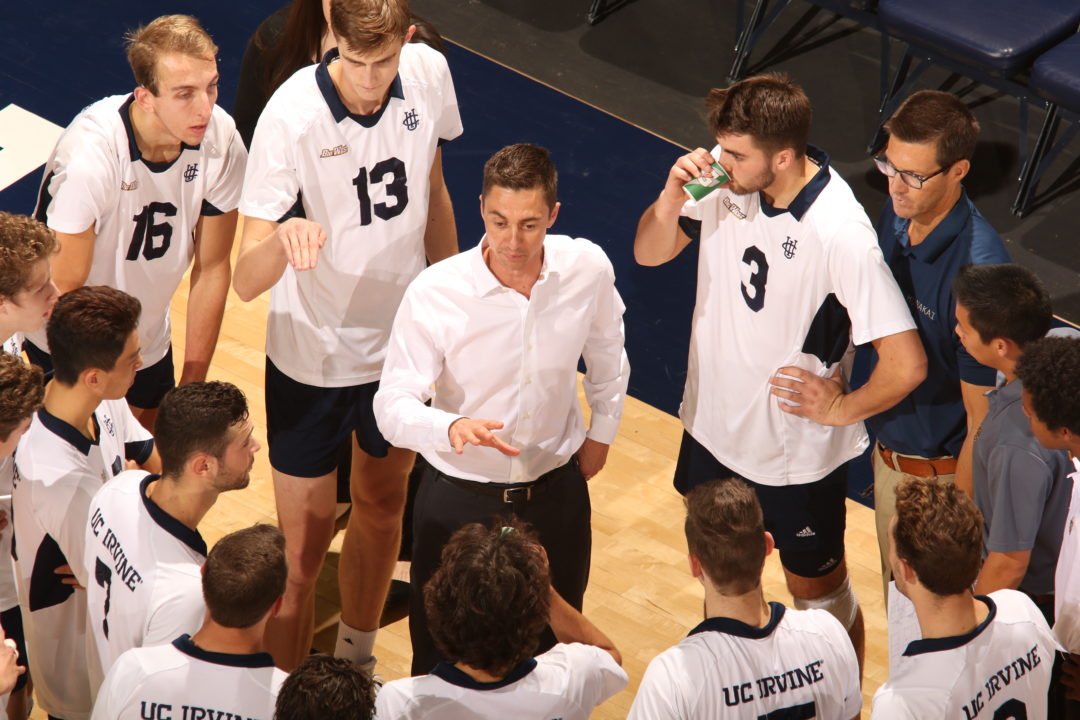
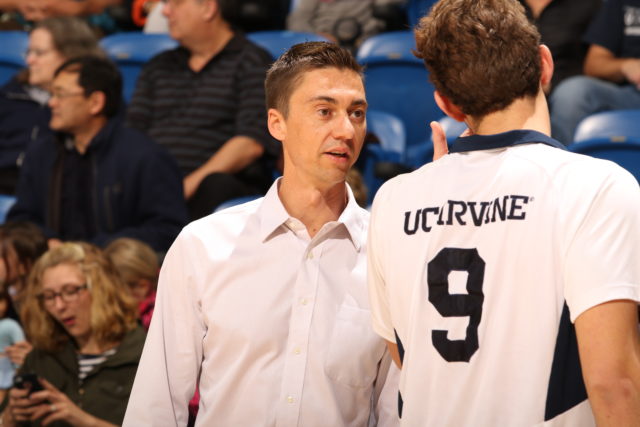
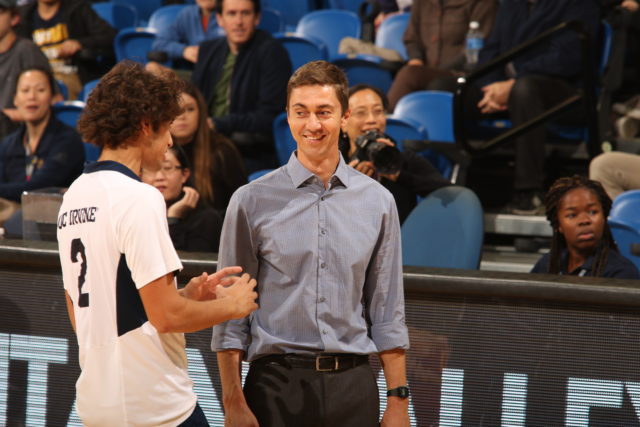
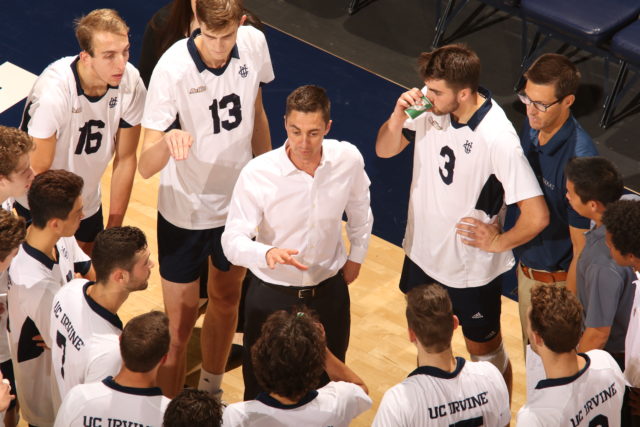
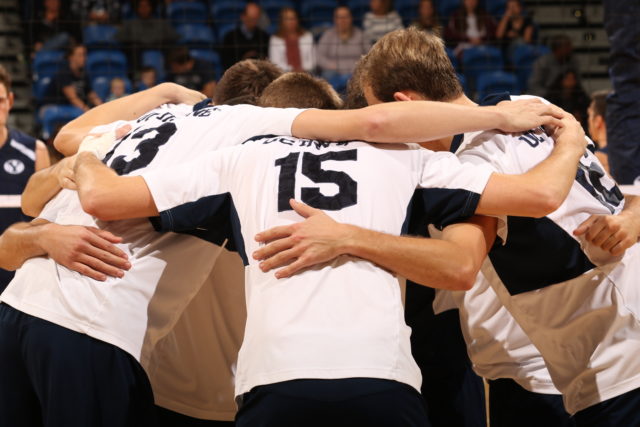
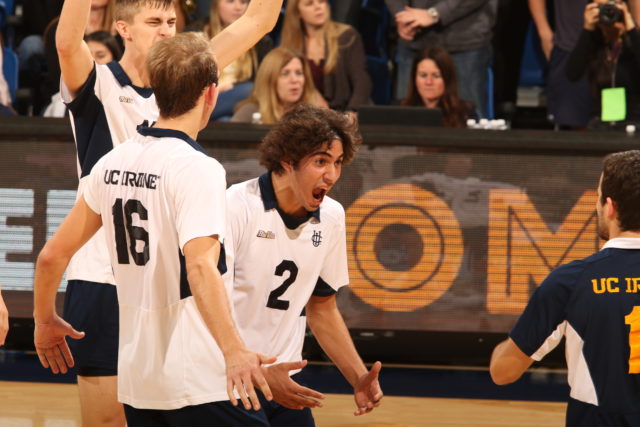
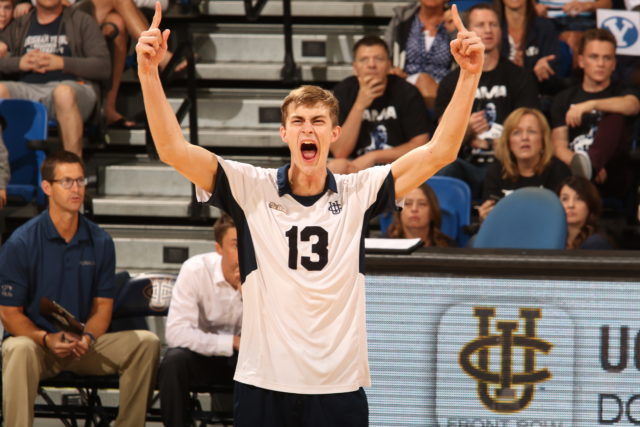
Leave a Reply